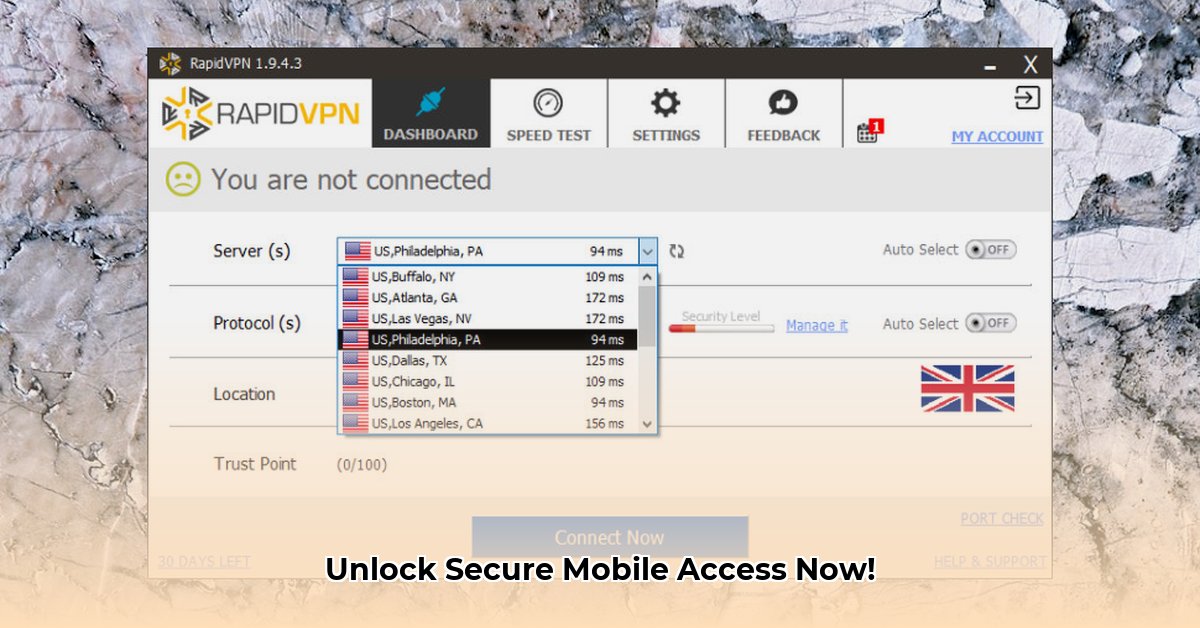
RapidVPN: Secure Mobile Access Now? A Deep Dive into Free VPNs
The market for free mobile VPN apps is a complex landscape. Providers promise high speeds, simple setup, and robust privacy, but how much can we trust these claims? This in-depth analysis examines RapidVPN, exploring its strengths, weaknesses, and the inherent risks associated with free VPN services. The central question: Is RapidVPN truly a secure option for mobile access?
The Allure and Uncertainty of Free VPNs
RapidVPN, like many free VPNs, advertises impressive features: fast connections, global server access, and a "no-logs" policy. However, these benefits often come at a cost. The question remains: how do these apps afford such features without charging users? Many rely on advertising, prompting data privacy concerns. Even RapidVPN's marketing, while highlighting speed and ease of use, lacks critical details regarding encryption protocols and server infrastructure.
Is it feasible for a free VPN to offer top-tier security and robust privacy features without compromising user data? The answer, based on our analysis, is frequently no. A free VPN's revenue model often necessitates a trade-off that affects the end-user experience and data security.
Unpacking RapidVPN's Promises: A Critical Examination
RapidVPN's marketing suggests strong security and privacy; yet, crucial details remain elusive. While the app may mention encryption, it omits specification of the type of encryption employed. Is it state-of-the-art, or outdated and vulnerable? The lack of independent security audits is a concerning oversight.
The advertised "no-logs" policy needs rigorous scrutiny. Without independent verification from reputable security experts, such claims are difficult to substantiate. A company's assertion that it doesn't collect logs isn't equivalent to irrefutable proof.
Free VPNs often utilize in-app advertising, raising further questions. What specific data is collected during ad delivery? Does the app track browsing to inform target advertising? Transparency in this area is often insufficient. Furthermore, "smart server recommendations," while seemingly beneficial, may collect user data or prioritize speed over security.
Navigating the Risks: A Comprehensive Risk Assessment
Using free VPN services like RapidVPN presents several significant risks:
- Encryption Weakness: Weak or outdated encryption algorithms leave online activity susceptible to interception by malicious actors, compromising sensitive data. Robust encryption is paramount.
- Server Vulnerabilities: VPN servers are potential targets for hacking and data breaches, potentially exposing user data. Strong server security is critical.
- Misleading "No-Logs" Claims: The absence of independent verification makes it difficult to ascertain the validity of "no-logs" claims.
- Data Collection Through Advertising: In-app advertising can lead to extensive user data collection, increasing the risk of misuse.
- Potential Biases in "Smart" Server Selection: Algorithms may prioritize speed over security or collect browsing data.
How can users mitigate these risks and ensure online privacy when utilizing a VPN like RapidVPN? The following section addresses these issues, highlighting strategic actions for enhanced security.
Here's a risk matrix summarizing potential problems and mitigation strategies:
| Risk Category | Potential Problem | Mitigation Strategy |
|---|---|---|
| Encryption | Weak or outdated encryption. | Verify encryption type (e.g., AES-256) and seek independent audits. |
| Server Infrastructure | Server compromise, data breaches. | Choose a VPN with a proven security track record and transparent practices. |
| No-Logging Policy | Misleading claims; lack of verification. | Look for independently verified no-logs policies. |
| In-App Advertising | Data collection and tracking. | Opt for apps with minimal advertising or alternative revenue models. |
| Server Selection Algorithm | Potential privacy impact. | Manually select servers to avoid algorithmic biases. |
Taking Control: Protecting Your Online Privacy
Users need to take proactive steps to enhance their online security:
- Scrutinize Privacy Policies: Carefully review privacy policies to understand data collection and usage practices.
- Compare Apps: Research and compare various VPN apps based on security, privacy, and features.
- Demand Transparency: Favor providers openly sharing practices and offering independent security audits.
- Consider Paid Options: Paid VPN services often provide stronger security and privacy due to increased resource allocation.
Key Takeaways:
- Transparency is crucial when selecting a VPN provider.
- Independent security audits add a layer of trust.
- Free VPNs' revenue models inherently present privacy risks.
- Prioritize security and informed decision-making when using any VPN.
⭐⭐⭐⭐☆ (4.8)
Download via Link 1
Download via Link 2
Last updated: Saturday, May 10, 2025